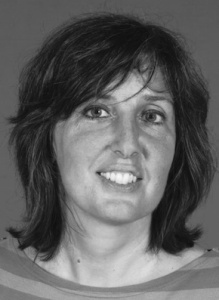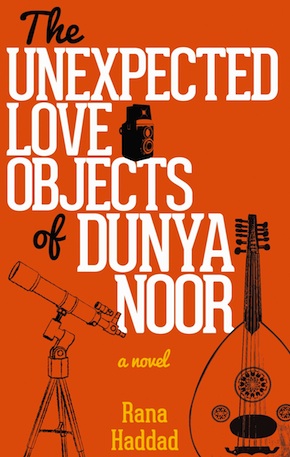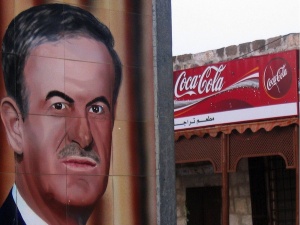The truth about love
by Rana HaddadThe Carmelite School for Girls, like every other school in Syria, was plastered with posters of Hero-President Hafez al-Assad, whose mustachioed face was used to ornament school notebooks, various textbooks, and the almost worthless lira coins. In the beginning, and to Patricia’s silent horror, Dunya became a child victim of brainwashing by the state, swallowing whole the hero worship of President al-Assad, whom she idolized as if he were a pop star. Her political naivety was only matched by her budding religious faith, a faith that had been drummed into her by a cast of nun-trained religious education teachers. “Those who haven’t been baptized will surely go to hell.” Their teacher used to break this good news to them, while waving a stick in the air.
The Carmelite School had a separate religious education class for Muslim children, so that they could be spared the bad news. Christian children were often taught by fat women in black dresses (widows), while Muslims tended to have male teachers with strangely unfashionable brown suits and a mystical look in their eyes. They often wore silver wedding rings that were rumored to be a sign of membership of the Muslim Brotherhood – a secret and dangerous underground movement whose members promoted the growing of full beards rather than mustaches. They told their students in hushed voices that their non-Muhammad-loving friends were “infidels.” And even though both groups believed everything their teachers told them while in the classroom, they forgot all about it and played together later, hiding the terrible truths they learned from one another.
In those early years, Dunya and most of her friends not only idolized and had blind faith in President Hafez al-Assad, but they also blindly believed in Jesus Christ, the Prophet Muhammad, and miracles.
“Faith is everything. Faith can move mountains,” Maria Ghazi once tried to explain to Dunya. Maria was an especially religious child who tended to obsess about God, Jesus, and Mary even during history lessons. “Ask God for something and he will give it to you. But you need to have real faith, you must believe it will happen, otherwise it won’t. He can read your mind so you mustn’t just pretend… You must really feel it,” she whispered to Dunya.
“So if I ask him to send me an object, would that materialize in front of me here in the room…. right now?” Dunya asked.
“Of course. Ask him for an apple, for instance – just to test him – and you’ll see.”
“Apple. Apple. God Almighty, send me an apple,” Dunya mumbled and then waited. “Nothing’s happening,” she said.
“Do you one hundred percent believe that God will send you the apple?” Maria asked Dunya. “Try to really feel it, believe it, here, here.”
She pointed at her own heart.
And sure enough, as soon as Dunya began to convince herself of the possibility that God would soon send her an apple, a huge red apple landed in her lap.
When the rather plump Madame Georgette saw Maria take an apple from a bag hidden under the table and throw it onto Dunya’s lap, she came over with her long metal-centered cane and caned the two girls in front of a placid audience of pupils.
“I will ring your father if you carry on like this,” Madame Georgette said with a mouth full of rice as Dunya was going out for lunch break. Madame Georgette often brought to school a Tupperware container full of stuffed zucchini, which she would eat angrily because she thought that children shouldn’t be allowed such long lunch breaks.
Never look a boy in the eyes, and never smile at him, never ever. This is essential advice, my girls. Looking a boy in the eyes is always the beginning of a calamity.”
Although the Carmelite School for Girls was supposed to be mainly for girls, boys were allowed to attend it until the age of eleven. After that it was considered that friendship between girls and boys was impossible and so the boys were swiftly packed off to a private boys’ school called Kileye, where most of their fathers had also been indoctrinated in the arts of Syrian manhood and the highly evolved sciences of patriarchy.
It was around that time that Maria Ghazi’s half-blind grandmother Anaïs invited Maria and Dunya over for one of her regular preaching sessions and announced the following:
“I want to explain to you the truth about boys. It is a universal truth and whatever anyone else tells you, don’t believe them! Listen to me carefully and etch these words in your brains. One day, you might accidentally look at a boy and he will smile at you; if you happen to be stupid enough to smile back at him, he will think that you love him. Boys are arrogant and vain. The boy will then begin to send you letters and slowly try to make you think you are in love with him. Don’t ever believe him! Never look a boy in the eyes, and never smile at him, never ever. This is essential advice, my girls. Looking a boy in the eyes is always the beginning of a calamity. If you look at random boys and let yourselves be tricked, the most terrible things will happen. You will become a laughing stock. Even the boy himself will laugh at you and tell all his friends about how he caught you in his trap. Boys like that usually write letters to a number of girls all at once, to see which one will answer. These are not letters, they’re bait. Boys are hunters and you’re their prey.”
“But don’t boys fall in love too?”
“Sometimes they do, but most of the time they’re lying. Don’t ever believe a boy.”
“What about granddad? How did you fall in love with granddad?” Maria asked.
“Fall in love? What are you talking about? Marriage is not about falling in love, my child. A sensible girl does not look for such things. No good marriage has ever been built on falling in love.”
Most girls stop wearing shorts by the time they’re ten. She’s almost a young lady now. She shouldn’t be exposing so much leg. Maybe her mother thinks we’re in England, but we’re not, Dr Noor.”
Although most of the boys who went to the Kiliye were from ‘good families’ that were well known and had been established in Latakia over many generations, only some of them were Christian, and it was only from that rather restricted pool of Christian boys that girls like Dunya and Maria would be allowed to choose a husband. And even if they couldn’t give up the idea of love or didn’t miraculously fall in love with one of these endangered species of boys, they would one day nevertheless be expected to marry one.
Despite his years in England, Joseph was as traditional and conservative as any other father in Syria. When he began to notice that Dunya was beginning to look at boys and be looked at, he wished he could hide her in a cupboard and let her out of the house only with armed protection.
One day, the greengrocer Kamil had the cheek to say to him, with a pained look in his eyes, “I’ve seen your daughter out with a boy called Malek, the son of a fisherman. And they were holding hands Dr Noor, and he tells people she’s his fiancée…”
Dr Noor felt a sense of deep shock and fear but pretended he didn’t take Kamil seriously. Kamil the grocer didn’t stop at that, however. He frowned and tut-tutted and added, “What will people think? And who will want to marry your daughter in the future, if she is seen with a boy like that? Also, she still wears shorts, Dr Noor. Most girls stop wearing shorts by the time they’re ten. She’s almost a young lady now. She shouldn’t be exposing so much leg. Maybe her mother thinks we’re in England, but we’re not, Dr Noor.”
If a lowly shopkeeper like Kamil thought it fit to be giving Dr Noor advice on how to bring up his daughter, then things were really getting out of hand. And Dunya was not yet twelve.
That afternoon, Joseph sent one of his more stocky male nurses to Malek’s house to slap him once or twice on the face and tell him to keep his filthy, fishy hands off Dunya. “Who do you think you are?” the nurse demanded, after he slapped Malek a third time and threatened to report him to the police if he saw him with Dunya again. “Boys like you should be whipped. Next time I will have you whipped, do you hear me?”
For many weeks after that incident Dunya was grounded, her bedroom was searched for love letters and photographs, any traces of the dangerous arsenal that boys used in their campaigns to ensnare unsuspecting girls. Dunya insisted that she was not, and never had been, in love with Malek, but no one believed her.
On the day Dunya met Malek, she had seen him looking at her with his dark eyes that were framed by his long, dark eyelashes. She looked back at him and smiled. Then she waited to see if anything would happen.”
Dunya had met Malek when she was trying to understand the truth about love. Granny Anaïs’ version did not ring true to her. Instead of avoiding love, she wanted to discover exactly what it was and why everyone was so scared of it; why was it seen as such a dangerous and dark force that must be combatted at all cost?
And so, in addition to her interest in her camera, the only other thing that captured Dunya’s heart in those early years was the idea of love. She thought about it and read about it, and she talked about it with Maria over and over again. They secretly read love poetry to one another to try and discover the truth. Dunya could not believe that the people who had written these poems, many of whom were men, were lying.
They had both heard that when love occurred, the object of one’s love would begin to sparkle and then he would look as if he were bathed in light. It was then that a girl’s heartbeats would accelerate and she would soon feel as if she had grown a pair of wings.
On the day Dunya met Malek, she had seen him looking at her with his dark eyes that were framed by his long, dark eyelashes. She looked back at him and smiled. Then she waited to see if anything would happen. Would she? Wouldn’t she? Did she? Didn’t she?
In her intensive researches about love, Dunya had come to the conclusion that what Granny Anaïs had said was partly true, that looking at boys and being looked at was the first and most guaranteed way to fall in love. But she also discovered something new that no one had ever revealed to her or to Maria before, which was that real love, the most intense and life-altering variety, was the sort where one loved a boy and was loved by him at first sight – without words having been spoken or letters received or exchanged. Love at first sight was produced when twin souls happened to look into each other’s eyes.
But instead of experiencing the pain and pleasure of falling in love when she saw Malek, Dunya caused a scandal. And from then on, society women always talked about her and her fisher-boy lover – which was not a good reputation to acquire at such an early age. Falling in love with any boy was seen as a tremendous criminal offense in those days, but to fall in love with a fisherman’s son – that was beyond anyone’s understanding.
From The Unexpected Love Objects of Dunya Noor (Hoopoe, £9.99)
 Rana Haddad grew up in Latakia in Syria, moved to the UK as a teenager, and read English Literature at Cambridge. She has since worked as a journalist for the BBC, Channel 4 and other broadcasters, and has also published poetry. The Unexpected Love Objects of Dunya Noor, her first novel, is published by Hoopoe, an imprint of the American University in Cairo Press.
Rana Haddad grew up in Latakia in Syria, moved to the UK as a teenager, and read English Literature at Cambridge. She has since worked as a journalist for the BBC, Channel 4 and other broadcasters, and has also published poetry. The Unexpected Love Objects of Dunya Noor, her first novel, is published by Hoopoe, an imprint of the American University in Cairo Press.
Read more
Facebook: The Unexpected Love Objects of Dunya Noor
@SyrianMoustache



